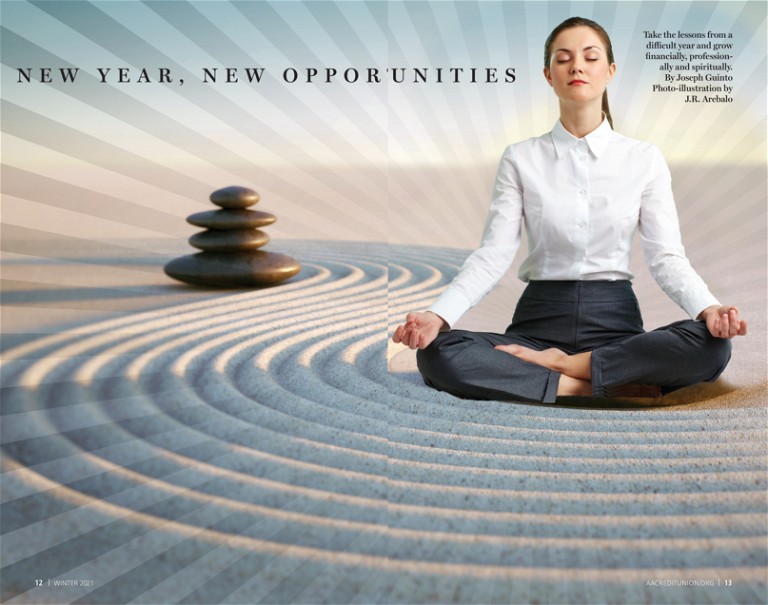NEW YEAR, NEW OPPORT UNITIES
Take the lessons from a difficult year and grow financially, professionally and spiritually. By Joseph Guinto Photo-illustration by J.R. Arebalo
by J.R. Arebalo


ur home lives, careers and finances have all been upended by the pandemic and the economic downturn. Those challenges are not likely to go away soon. Still, as this year winds down, we can work toward a new normal — one that can be more professionally rewarding, more financially secure and more spiritually enlightened. Here are six habits to adopt now in hopes of creating a better 2021.

Improve your financial security. ONE:
Build up your retirement and emergency funds. Reassess your savings plan, based on what you have, and, importantly, what you have not spent money on during the pandemic. “The current times make people realize that it’s possible to cut significant spending on a lot of things, such as restaurant dine-ins and takeouts and luxury goods,” says Ian Wright, the CEO and Founder of Bequests, a retirement information site. “Funnel the money you’ve been saving into your retirement savings or into building your emergency funds,” Wright says.

TWO: Make a habit of paying down debt. “Consolidate your debts so you’re not paying interest on multiple loans, and make more than the minimum payment whenever possible,” says Zach Reece, the chief operating officer of Colony Roofers in Atlanta. “Then, when emergencies arise, you will be in good standing and have a good credit score to either up your card limits or get loans more easily.”
Advance your career.
ONE: Start each day with the hardest stuff. Alex Azoury, the founder and CEO of Home Grounds — a company that helps amateurs brew coffee from home like baristas in the shop — always begins his day tackling the toughest, most unpleasant tasks first and then moves on to tasks he enjoys. “That not only checks those unpleasant tasks off my to-do list in a satisfying way, but it makes me more a person of my word,” Azoury says. “It proves I will show up and do something I have to do, even if I don’t want to.”

TWO: Work is hard, especially now. But make a habit of being as positive as you can as often as possible. “Bitterness, resentment and constant complaining hinder growth,” says Ian Kelly, vice president of operations for NuLeaf Naturals, which makes hemp wellness products. “Choose instead to be solutions oriented, open to feedback, optimistic and supportive of others.”

Boost spirituality.
ONE: Express gratitude each night to a higher power. Whether that’s God or some other type of universal life force or just something that’s beyond your own self, recognize and give thanks for the good that flows from that power. “By directly thanking the source of the good things in our lives, we are more connected with that source and increase that connection,” says Keith Felty, a happiness expert who wrote the book, “America, the Happy.”
TWO: A daily habit of mindful meditation might help to lift, or at least redistribute some of the mental weight that the pandemic and uncertain economy have had on us all. “For a society wholly dependent on technology, this brief disconnect is a moment of silent comfort,” says David Foley, the founder and CEO of Unify Cosmos, a site offering meditation guides. “Sometimes, the simpler things hold the most importance in life. Sit in a quiet room for 10 or 20 minutes. Let thoughts pass you by, and practice being in the moment.”
KEEP FAMILY TIME
As life gets back to normal sometime in 2021, the close family ties many have created over the long lockdown period may come undone. They don’t have to. Experts advise families prioritize hanging onto new traditions like these:
• Cooking together regularly
• Doing puzzles weekly
• Taking a daily walk or bike ride
• Doing the small things constantly like holding hands and hugging
JOSEPH GUINTO, a freelance writer and editor in Washington, D.C., has made a habit of calling his mother more often this year.